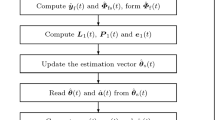Abstract
In many engineering applications concerning the recovery of signals from noisy observations, a common approach consists in adopting autoregressive (AR) models. This paper is concerned with not only the estimation of multichannel autoregressive (MAR) model parameters but also the recovery of signals. A new noise compensated parameter estimation scheme is introduced in this paper. It contains an advanced least square vector (ALSV) algorithm which not only keeps the advantage of blindly estimating the MAR parameters and the variance-covariance matrix of observation noises, but also aims at ensuring the variance-covariance matrix to be symmetric in each iterative procedure. Moreover, the estimation of variance-covariance matrix of input noise is proposed, and then we form an optimal filtering to recover the signals. In the numerical simulations, the estimation performance of the ALSV estimation algorithm significantly outperforms that of other existed methods. Moreover, the optimal filtering based on the ALSV algorithm leads to more accurate recovery of the true signals.
Similar content being viewed by others

References
Chen W, Zhang R (2004) Estimation of time and frequency selective channels in OFDM systems: a Kalman filter structure. In: Proc of Globecom’04, pp 800–803
Haykin S (1996) Adaptive filter theory. Prentice-Hall, Englewood Cliffs
Hasan MK, Yahagi T (1996) An iterative method for identification of multichannel autoregressive processes with additive obversation noise. IEICE Trans Fundam 795:674–680
Hasan MK, Hossain MJ, Haque MA (2003) Parameter estimation of multichannel autoregressive processes in noise. Signal Process 83(3):603–610
Kay SM (1988) Modern spectral estimation. Prentice-Hall, Englewood Cliffs
Kay SM (1980) Noise compensation for autoregressive spectral estimates. IEEE Trans Acoust Speech Signal Process 28:292–303
Mahmoudi A, Karimi M (2008) Estimation of the parameters of multichannel autoregressive signals from noisy observations. Signal Process 88:2777–2783
Labarre D, Grivel E, Christov N, Najim M (2007) Dual H ∞ filter for signal processing application to speech enhancement. IEEE Trans Signal Process 55:5195–5208
Lofberg J (2004) YALMIP: A toolbox for modelling and optimization in MATLAB. In: IEEE international symposium on computer aided control systems design, pp 284–289
Lumulla S, Kassam S, Venkatesh S (1998) An adaptive driversity receiver for OFDM in fading channels. In: Proc of IEEE-ICC’98, vol 3, pp 1325–1329
Marple S (1987) Digital spectral analysis with applications. Prentice-Hall, Englewood Cliffs
Petitjean J, Grivel E, Bobillet W, Roussilhe P (2009) Multichannel AR parameter estimation from noisy observations as an errors-in-variables issue. Signal Image Video Process 4(2):209–220
Pham DT, Tong DQ (1994) Maximum likelihood estimation for a multivariate autoregressive model. IEEE Trans Signal Process 42:3061–3072
Qu XM, Zhou J, Luo YT (2009) An advanced parameter estimator of multichannel autoregressive signals from noisy observations. In: IEEE international conference on information engineering and computer science, pp 881–884
Russ J, Casbeer D, Swindlehurst A, Lee (2004) STAP detection using space-time autoregressive filtering. In: Proc of IEEE-radar conference’04, pp 541–545
Schlogl A (2006) A comparison of multivariate autoregressive estimators. Signal Process 86:2426–2429
Sturm JF (1999) Using SeDuMi 1.02, a MATLAB toolbox for optimization over symmetric cones. Optim Methods Softw 11–12:625–653
Zheng WX (2002) A new estimation algorithm for AR signals measured in noise. In: Proc the ICSP Conference, vol 1, pp 186–189
Zheng WX (2005) Fast identification of autoregressive signals from noisy observations. IEEE Trans Circuits Syst II, Express Briefs 52(1):43–48
Zheng WX (2006) On estimation of autoregressive signals in the presence of noise. IEEE Trans Circuits Syst II, Express Briefs 53(12):1471–1475
Author information
Authors and Affiliations
Corresponding author
Rights and permissions
About this article
Cite this article
Qu, X., Zhou, J. & Luo, Y. A new noise-compensated estimation scheme for multichannel autoregressive signals from noisy observations. J Supercomput 58, 34–49 (2011). https://doi.org/10.1007/s11227-010-0530-z
Published:
Issue Date:
DOI: https://doi.org/10.1007/s11227-010-0530-z



